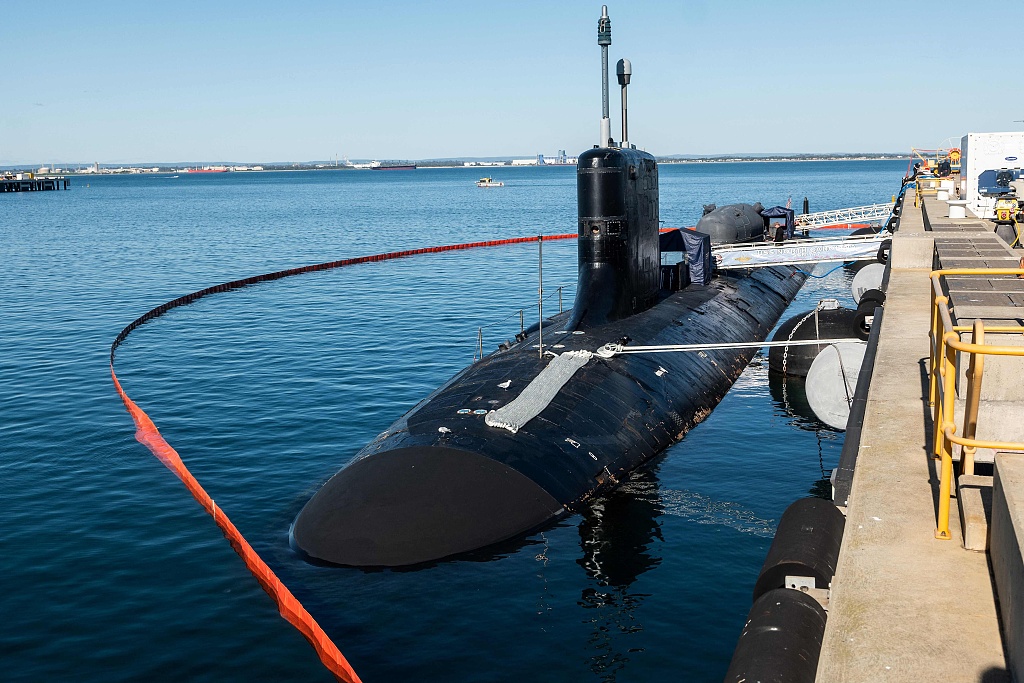US looking to squeeze even more from Australia


The United States Department of Defense confirmed on Wednesday it has recently launched a review of the AUKUS security deal which was signed by the Joe Biden administration with the United Kingdom and Australia in 2021.
The Department of Defense is reviewing AUKUS to ensure that this initiative of the previous administration "is aligned with the President's 'America First' agenda", the department's press office told Xinhua in an email.
The Department of Defense said in the email, "This means ensuring the highest readiness of our service members, that allies step up fully to do their part for collective defense, and that the defense industrial base is meeting our needs."
The review is being led by Under Secretary of Defense for Policy Elbridge Colby, who has previously voiced skepticism about AUKUS.
Australia's Defense Minister Richard Marles said on Thursday he was confident the AUKUS submarine pact with the US and the UK would proceed, and his government would work closely with the US while the Republican administration conducted the review.
Australia in 2023 committed to spend A$368 billion ($239 billion) over three decades to acquire and build nuclear-powered submarines through the auspices of AUKUS. A deal that is just a fig leaf for the US and the UK to transfer nuclear technology and weapons to a nonnuclear country in the Asia-Pacific in defiance of their nonproliferation obligations.
AUKUS is a geopolitical initiative of the previous Biden administration to implement its China containment strategy in the region. Although its claimed objective is to ensure the region is "free, open and safe", it introduces bloc confrontation to the Asia-Pacific and causes substantial nuclear proliferation risks in the region.
Marles told the media in recent interviews that AUKUS was in the strategic interests of all three countries and the review of the deal signed in 2021 was not a surprise, saying that "This is a multi-decade plan. There will be governments that come and go and I think whenever we see a new government, a review of this kind is going to be something which will be undertaken".
John Lee, an Australian "Indo-Pacific" expert at Washington's conservative Hudson Institute think tank, told the media that the Defense Department review was "primarily an audit of American capability" and whether it can afford to sell up to five nuclear-powered submarines to Australia when it was not meeting its own production targets.
And John Hamre, the president of the Center for Strategic and International Studies and a former senior Pentagon official, told a Lowy Institute seminar in Sydney on Thursday there is a perception in Washington "the Albanese government has been supportive of AUKUS but not really leaning in on AUKUS", and its reluctance to raise its defense spending from 2 percent of Australia's GDP to 3.5 percent — it has only agreed to raise it to 2.3 percent — as required by the Republican administration is part of this.
The signs suggest the US administration is taking the review as a chance to raise the price, in different forms, if Australia really wants to continue with the agreement, or else make it a bargaining chip in the two countries' economic and trade negotiations that are still underway to force Canberra to make concessions on other fronts.
Under AUKUS, Australia was scheduled to make a $2 billion payment in 2025 to the US to help boost its submarine shipyards and speed up the lagging production rates of Virginia-class submarines to allow the sale of up to three US submarines to Australia from 2032, with options to purchase two more. The first $500 million payment was made when Marles met with his US counterpart Pete Hegseth in February.
If the US raises the rate, whether the UK will follow suit remains to be seen. The UK is to help Australia build an entirely new nuclear-powered submarine that is expected to come into service from 2040, according to the deal.
The G7 Summit in Canada from Sunday to Tuesday is expected to provide the three countries a chance to negotiate on the future of the deal, or, as is being suggested, another chance for the US to fleece Australia.


































